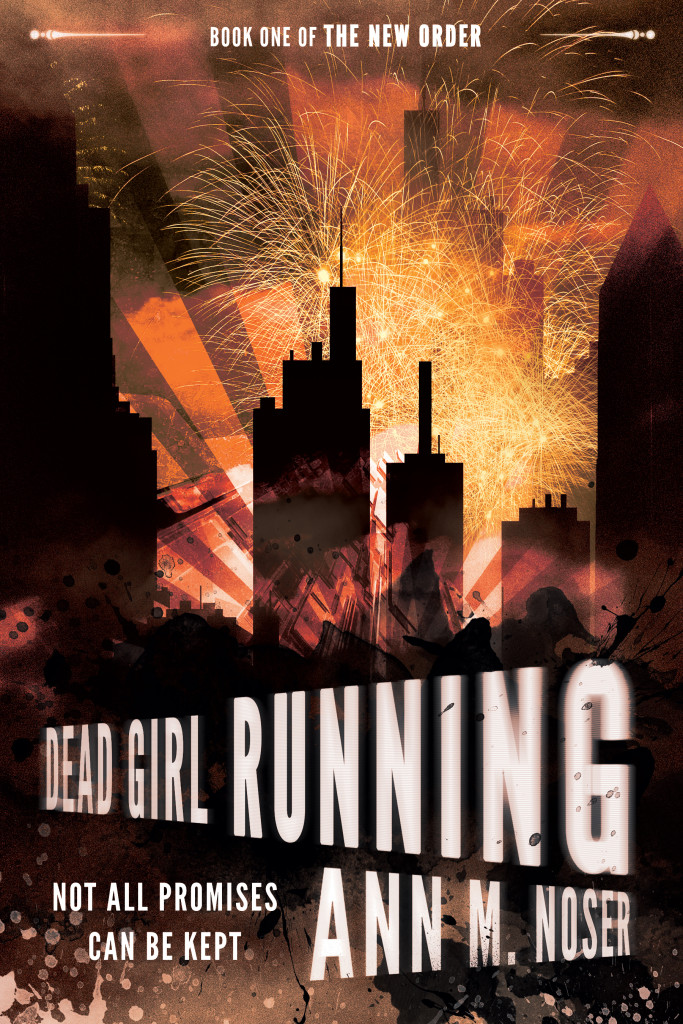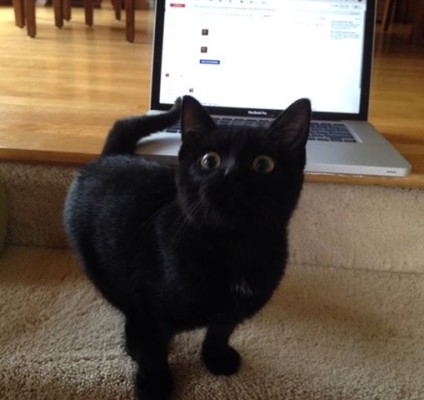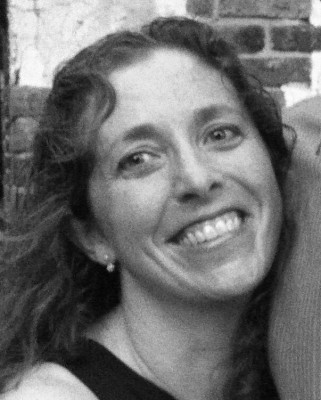Well, it’s not quite Thursday anymore, but today was busy. Sneaking in this post after finishing up a proofreading project. I recently had the opportunity to read a pre-release copy of Ann Noser’s Dead Girl Running novel, and she agreed to this interview in anticipation of the book’s October 26th release date.
A fellow Curiosity Quills author, Ann’s first book How to Date Dead Guys was a wonderful story. Though this novel isn’t within the same setting, she brings her characters to life in a genuine way that has you rooting for them as she proceeds to torture the hell out of them as soon as she gets you to like them.
Thanks, Ann, for being willing to do the interview, and may Dead Girl Running do well!

Dead Girl Running
Eight years ago, SILVIA WOOD’s father died in an industrial accident. After suffering through years of Psychotherapy Services and Mandated Medications for depression and multiple suicide attempts, she longs to work in Botanical Sciences. When the Occupation Exam determines she must work in Mortuary Sciences instead, she wonders if the New Order assigned her to the morgue to push her over the edge.
To appease her disappointed mother, Silvia enters the Race for Citizen Glory, in an attempt to stand out in the crowd of Equals. After she begins training with “golden boy” LIAM HARMAN, she discovers he also lost his father in the same accident that ruined her childhood. Then Silvia meets and falls for Liam’s older cousin, whose paranoid intensity makes her question what really happened to her father. As the race nears, Silvia realizes that she’s not only running for glory, she’s running for her life.

Interview
- Your first novel, How to Date Dead Guys, is a contemporary paranormal story about witchcraft and ghosts. How’d you go from that to the near-future dystopian Dead Girl Running?
I do realize that it’s “recommended” for new authors to stay within the same genre (at least at first), but I simply write what interests me and what stories flood my mind. Different moments inspire me. How to Date Dead Guys was inspired by a late night NPR program on the Smiley Face Killers and my personal sadness over a friend’s recent death. Dead Girl Running was inspired by an online newspaper article about Agenda 21.
- Give us a quick idea of the themes in Dead Girl Running.
Self-preservation, mother-daughter relationships, coping with the loss of a loved one, the mental benefits of exercise, father figures, power and corruption.
- Hmm. Dead guys, dead Girl, I’m sensing a theme here… or am I reading too much into things?
I hope there’s not a theme! I promise to work VERY hard to stop using the word “dead” in my book titles (except for the How to Date Dead Guys series, which will continue with How to Ditch Dead Guys and conclude with How to Destroy Dead Guys). Perhaps, since I deal with life and death on a day-to-day basis as a veterinarian, some of this reality is bound to seep into my writing.
- Running is a primary story element in the book. Did you work that into the book because you enjoy it, or are you so into running that you wanted to write a book based around it?
It’s true that I am “so into running” that this might have influenced me. (I’m running—or at least attempting to run—a 50k trail ultra this coming Saturday, for example.) I chose to use a real race as the contest to make the idea of the book very real. Although I love Hunger Games and admire the ingenuity of the games involved, I wanted something so real it was scary.
(Good luck on the run Saturday!)
- Dead Girl Running has some dystopian aspects to the society that seem scarily possible given the way things are going today. What do you think influenced some of the worldbuilding you used here? Would you say you drew more on satirizing real life or from other fictional dystopias?
My goals were to avoid replicating other dystopias and to use little bits of information from the news articles I’d read on various topics: Agenda 21, government involvement with birth control, government control of food and portion sizes, etc. I very much wanted Panopticus to be a foreseeable future.
- From the mouths (or keyboards) of readers – what has been the greatest/most humbling thing you’ve heard about one of your books? And what’s been the most surprising? (E.g. ‘that molding cheese was the perfect allegory for human suffering’ [and you’re thinking: cheese is cheese.])
What makes me happiest is when a reader really loves one (or more) of my characters. I’m not sure why this makes me so pleased. Perhaps it’s because by the time I’m done torturing them, I REALLY love my characters. What surprised me the most were the people who came out for my book signings: friends from college, a high school teacher who was also my forensics coach and directed plays (she was SO GOOD at that), high school classmates, and old neighbors. I hadn’t seen many of these people in years and maybe never would have again if not for my book signing.
- When you’re writing, do you outline or sit down at the keyboard and see where the story goes?
A bit of both. I usually know the beginning and the end of the book. I write a very loose outline—with no form to it at all. It’s just a bunch of thoughts arranged in order of where they will show up in the book. (I don’t always follow this outline, however.) When I begin a chapter, I generally know where I start and where I end. That’s when I start typing.
- Which comes first for you, the story or the title?
The story comes first. Dead Girl Running was titled YA DYSTOPIAN for a long time. Then I spend forever trying to figure out a title. How to Date Dead Guys was entitled The Drownings for a long time, but no one liked it except for me.
- Silvia went through some rough events at an early age, which left quite a mark on her psyche. What do you see as having helped her cope with the issues and become the strong character she is at the time of the book’s events?
Silvia took control. She saved herself and her mother. Some of this was chosen and some of this was forced on her because of the situation. She chose yoga and running, both shown time and again to be beneficial to mental health. There are plenty of articles discussing how running is just another form of addiction and helps runners cope with previous (more damaging) addictions.
- You certainly do wear a lot of hats – Mom, Veterinarian, Author, Running, Yoga… My head spins even thinking about that. When do you sleep? Or do you? So far, your novels haven’t had animals as major characters. Do you foresee any future projects where the Author and Veterinarian spheres come together?
I don’t sleep enough, that’s for certain.
If you remember the character Bernard from How to Date Dead Guys, he was originally part of a fairy tale I wrote but was edited out. However, I loved him so much that I reincarnated him in How to Date. He was a veterinarian in the fairy tale, but a hospital manager in reincarnated form. I didn’t think pets belonged in Dead Girl Running. I snuck a cat in How to Date Dead Guys. There are lots of creatures in the fairy tale (entitled An Occasionally Grim Fairy Tale).
But, to more clearly answer your question, a topic I really feel the impulse to write about is Alzheimer’s Disease. I already write articles as a veterinarian, but haven’t felt an urge to write fiction as a veterinarian yet.

- The ending of Dead Girl Running left me eager for the next book in this series. Can you tell us anything about upcoming projects? HTDDG 2?
I hope to get back to work on Dead Girl Fighting (temporary title for book 2) sometime in the next few months. How to Ditch Dead Guys is on track to be published March 2016. An Occasionally Grim Fairy Tale just got accepted for publication by Fantasy Works Publishing.
- What aspect of Dead Girl Running took the most research/effort to make right? What was the most fun part about the project?]
Since I’m a mid-pack runner at best, I had to research winning times of major half marathons. I had to ask an ultrasonagrapher specialist the specific findings present in a human liver riddled with lymphosarcoma. Other than that, I just knew most everything else in the book. This is perhaps why it seemed so effortless for me to write it when compared to any other book I’ve written. I’ve done so very much more research for everything else. However, I’ll need a great deal of research before writing book 2.
- Talk a little about the cover design. What inspired it? Is there any specific symbolism with the fireworks?
The tall buildings, the starkness of the colors, the fireworks, and the smoke are all very visual details in the book. Yes, there is symbolism with the fireworks, but talking about it would result in a SPOILER ALERT.
- Are you superstitious about an interview having thirteen questions? (This is #14.)
TBH, I hadn’t even noticed this was the fourteenth question. Numbers don’t bother me.
- What is your favorite Book (if you can pick one – I know I struggle with this question. Feel free to answer with a genre/type rather than a specific title if there’s no clear favorite.) Favorite movie?
Whenever any one asks this IMPOSSIBLE question, I mumble something about The Lion, The Witch and the Wardrobe and then Anne of Green Gables and then Harry Potter and then someone mentions Katniss and I go off on how I love The Hunger Games and then I start to think about non fiction…
one asks this IMPOSSIBLE question, I mumble something about The Lion, The Witch and the Wardrobe and then Anne of Green Gables and then Harry Potter and then someone mentions Katniss and I go off on how I love The Hunger Games and then I start to think about non fiction…
My favorite movie is The Sound of Music. Judge me if you will.
Links
Blog: http://www.annmnoser.com
Facebook page: https://www.facebook.com/AnnMNoser
Twitter: https://twitter.com/AnnMNoser
Goodreads page: https://www.goodreads.com/author/show/8124757.Ann_M_Noser
Author Bio

My to-do list dictates that I attempt to cram forty-eight hours of living into a day instead of the usual twenty-four. I’ve chosen a life filled with animals. I train for marathons with my dog, then go to work as a small animal veterinarian, and finish the day by tripping over my pets as I attempt to convince my two unruly children that YES, it really IS time for bed. But I can’t wait until the house is quiet to write; I have to steal moments throughout the day. Ten minutes here, a half hour there, I live within my imagination.
Like all busy American mothers, I multi-task. I work out plot holes during runs. Instead of meditating, I type madly during yoga stretches. I find inspiration in everyday things: an NPR program, a beautiful smile, or a newspaper article on a political theory.
I’d love to have more time to write (and run, read, and sleep), but until I find Hermione Granger’s time turner, I will juggle real life with the half-written stories in my head. Main characters and plot lines intertwine in my cranium, and I need to let my writing weave the tales on paper so I can find out what happens next.


Thanks for the great interview!
You are quite welcome! Thank you for doing it.
I’ll let you know if I’m still alive after tomorrow’s ultra run. 🙂